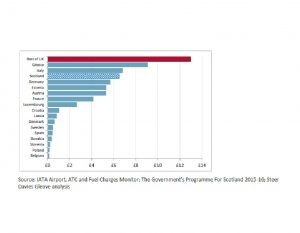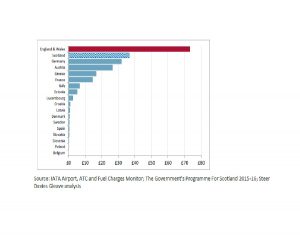Flying High? How Competitive is Air Passenger Duty?
New report sets out facts on UK flight tax – the highest in Europe and among highest in the world
With devolution of the tax to Scotland, is England set to lose out?
With just over a week to go before the Budget on 16 March, a new analysis of the UK’s tax on flying has been published. The detailed report, produced by Steer Davies Gleave and entitled ‘Flying High? How Competitive is Air Passenger Duty?’, assesses and benchmarks the UK’s Air Passenger Duty (APD) against similar taxes in Europe and the rest of the world.
The key findings are:
- UK APD has raised a total of £31 billion in total since its introduction in 1994 – from £331 million in its first full year of operation to £3.1 billion in 2015.
- UK APD is the highest European aviation tax for short haul and long haul flights by a long way.
| European
Ranking |
|
Short Haul Tax (economy) |
European Ranking |
|
Long Haul Tax
(economy) |
| 1 |
UK |
£13 |
1 |
UK |
£73* |
| 2 |
Greece |
£9.10 |
2 |
Germany |
£32 |
| 3 |
Italy |
£6.80 |
3 |
Austria |
£26.50 |
| 4 |
Germany |
£5.70 |
4 |
Greece |
£16.70 |
| 5 |
Estonia |
£5.30 |
5 |
France |
£14.50 |
| 6 |
Austria |
£5.30 |
6 |
Italy |
£6.80 |
| 7 |
France |
£4.20 |
7 |
Estonia |
£5.30 |
*The UK long-haul rate will increase from £71 to £73 for flights from 1st April 2016.
- UK APD has the highest rate of tax for long haul flights in the both the OECD and rest of the world.
| Global Ranking |
|
Long Haul Tax (economy) |
Global Ranking |
|
Long Haul Tax (other classes) |
| 1 |
UK |
£73 |
1 |
UK |
£146 |
| 2 |
Ghana |
£70.40 |
2 |
Ghana |
£105.60 |
| 3 |
Fiji |
£64.70 |
3 |
Pakistan |
£67 |
| 4 |
Djibouti |
£59.30 |
4 |
Fiji |
£64.70 |
| 5 |
Jordan |
£39.60 |
5 |
Djibouti |
£59.30 |
| |
|
|
|
|
|
| 26 |
Australia |
£27 |
33 |
Australia |
£27 |
| 30 |
USA |
£24.90 |
37 |
USA |
£24.90 |
| 35 |
Brazil |
£22.60 |
43 |
Brazil |
£22.60 |
| 80 |
Hong Kong |
£10.80 |
84 |
Hong Kong |
£10.80 |
| 94 |
South Africa |
£8.10 |
97 |
South Africa |
£8.10 |
| 100 |
China |
£7.50 |
103 |
China |
£7.50 |
| 110 |
UAE |
£5.70 |
112 |
UAE |
£5.70 |
| 117 |
India |
£3.65 |
117 |
India |
£3.65 |
| 118 |
Singapore |
£3 |
118 |
Singapore |
£3 |
- The Scottish Government is committed to reducing the burden of APD by 50% from 2018. If current UK APD rates were simply halved it would significantly improve Scotland’s competitive position compared with the rest of the UK.
Devolution of APD to Scotland – Short Haul (Band A) – comparison with Europe

Devolution of APD to Scotland – Long Haul (Band B) – comparison with Europe

Commenting on the publication of ‘Flying High? How Competitive is Air Passenger Duty?’ , Nathan Stower, Chief Executive of BATA said:
“This report presents a stark and sobering assessment of how internationally uncompetitive the UK’s tax on flying is. It also clearly illustrates the competitive advantage Scotland will gain over the rest of the UK after a halving of APD following devolution of the tax.
Last week, the Chancellor’s decision to abolish APD for under 16’s came into force, but passengers flying from UK airports are still forecast to pay over £3 billion in APD this year. We call on the Chancellor to transform the UK’s competitive position by setting a course for full abolition of APD during this Parliament in next week’s Budget Statement.”
Craig Kreeger, Chief Executive of Virgin Atlantic, said:
“This report demonstrates that the long haul rate of tax on UK air passengers is the highest in the world. The Government have made some positive steps forward over the last two years, but to become internationally competitive and support our economy this tax on exporters must be urgently reduced at the upcoming Budget.”
Carolyn McCall, Chief Executive of easyJet, said:
“This new independent report shows how uncompetitive Air Passenger Duty (APD) makes the UK compared to Europe and the rest of the world. This is one league table no country wants to come top of and provides further evidence to support the campaign to abolish APD.
“The Government has already removed the tax for children and we hope that it will abolish this tax completely, helping to make travel more affordable for all passengers and boosting the UK economy by supporting tourism, investment and business activity.”
Steer Davies Gleave was appointed by BATA to provide background information on UK APD, including historical trends and international comparisons, as well as context on taxation of other public transport modes in the UK.
The new report sets out the history of APD, including the amount of revenue raised each year, which has gone from £330m to over £3bn in 21 years. In total, APD has raised £31bn since its introduction in 1994. Rates for domestic and short haul economy flights have increased by 160% (£5 to £13) while the tax rate for economy flights to the rest of the world rose by 630% (£10 to £73).
The research confirms that APD is the highest aviation tax levied on passengers departing from airports in the EU, Norway and Switzerland, for both short-haul and long-haul journeys in all classes of travel. UK APD for short haul flights is 43% higher than Greece, nearly twice as high as Italy, more than two times the rate in Germany and three times that of France. Band B – the long-haul rate – is £73 per passenger travelling in economy from 1 April. This is more than twice the level of the next highest tax for long-haul journeys, which is levied by Germany (£32).
Overall, when compared with other international peers including the OECD grouping of countries, such as Japan, Australia and the USA, the UK has the highest rates of APD for long haul flights and some short haul flights.
The UK has the fifth highest tax within the OECD for domestic and short-haul economy flights, but the highest tax for business class short haul flights and has the dubious accolade of having the highest tax in the world on long haul flights.
Globally, the UK ranks 27th and 61st highest in the world for short haul business and economy flights respectively, with the data clearly showing the UK sitting apart from its competitors in Europe and many other major economies.
The report also considers the situation in Scotland, where control over APD is about to be devolved and the current Scottish Government has publicly committed to cut the tax by half from 2018, with full abolition to follow when finances allow. If UK rates were simply halved, it would positively affect Scotland’s ‘air tax competiveness’ and all the benefits that flow from that. Scotland would improve its standing by 38 places over the rest of the UK in the global competitiveness league for tax on short haul economy flights. Scotland would rank 9th highest for tax on long haul economy flights, leaving England and Wales at the top of the league with the most uncompetitive tax of its type in the world. While this means Scotland would still be less competitive than most EU countries, it would have a huge competitive advantage over the rest of the UK.
ENDS
7 March 2016



